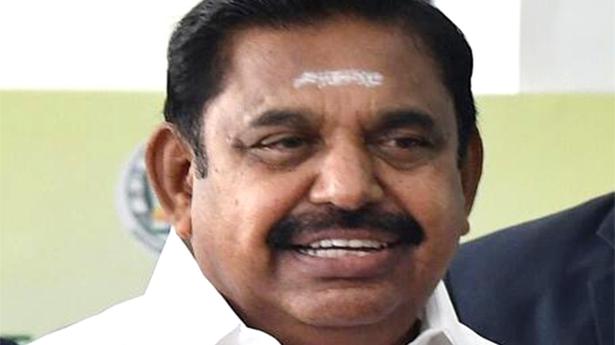
Edappadi Palaniswami appeals against Madras High Court order in favour of O. Panneerselvam
The Hindu
Says, in no circumstances they can jointly act as Coordinator & Joint Coordinator of AIADMK
All India Anna Dravida Munnetra Kazhagam (AIADMK) leader Edappadi K. Palaniswami on Thursday chose to prefer an appeal against an order passed by a single judge of the Madras High Court on Wednesday declaring as void a July 11 general council meet in which he got elected as interim general secretary.
Appearing before the second Division Bench of Justices M. Duraiswamy and Sunder Mohan, Senior Counsel Vijay Narayan made a request for urgent hearing of the appeal on Monday. The senior judge in the Bench agreed to take it up on Monday if the Registry numbers the appeal by Thursday afternoon.
In his grounds of appeal, Mr. Palaniswami said, the single judge had completely ignored the fact that the posts of the Coordinator and Joint Coordinator had lapsed and therefore in no circumstances could they jointly act to convene any executive council or general council meeting as directed by the judge.
He also said, the single judge had erred and failed to look into pertinent facts while ordering status quo ante as on June 23 and ruling against the July 11 general council meet in which the other leader O. Panneerselvam was expelled from primary membership of the party.
"The learned single judge's order is illegal, and unsustainable in the eye of law. The impugned order has been passed on assumptions and irrational reasoning which makes it completely unworkable and arbitrary," Mr. Palaniswami said and urged the court to stay the operation of the order until it gets set aside.
According to the appellant, the single judge had passed the order without any cogent reasoning and therefore, it directly interferes with the internal affairs of a political party and curtails the functioning of the party by ignoring the wishes of the majority of the members.
"The impugned (under challenge) Order literally propagates the wish of a single person for dual leadership when the entire party has moved towards single leadership. The observations in the said paragraph and the other passages on internal functioning of the party is not within the domain of judicial scrutiny," his affidavit read.













